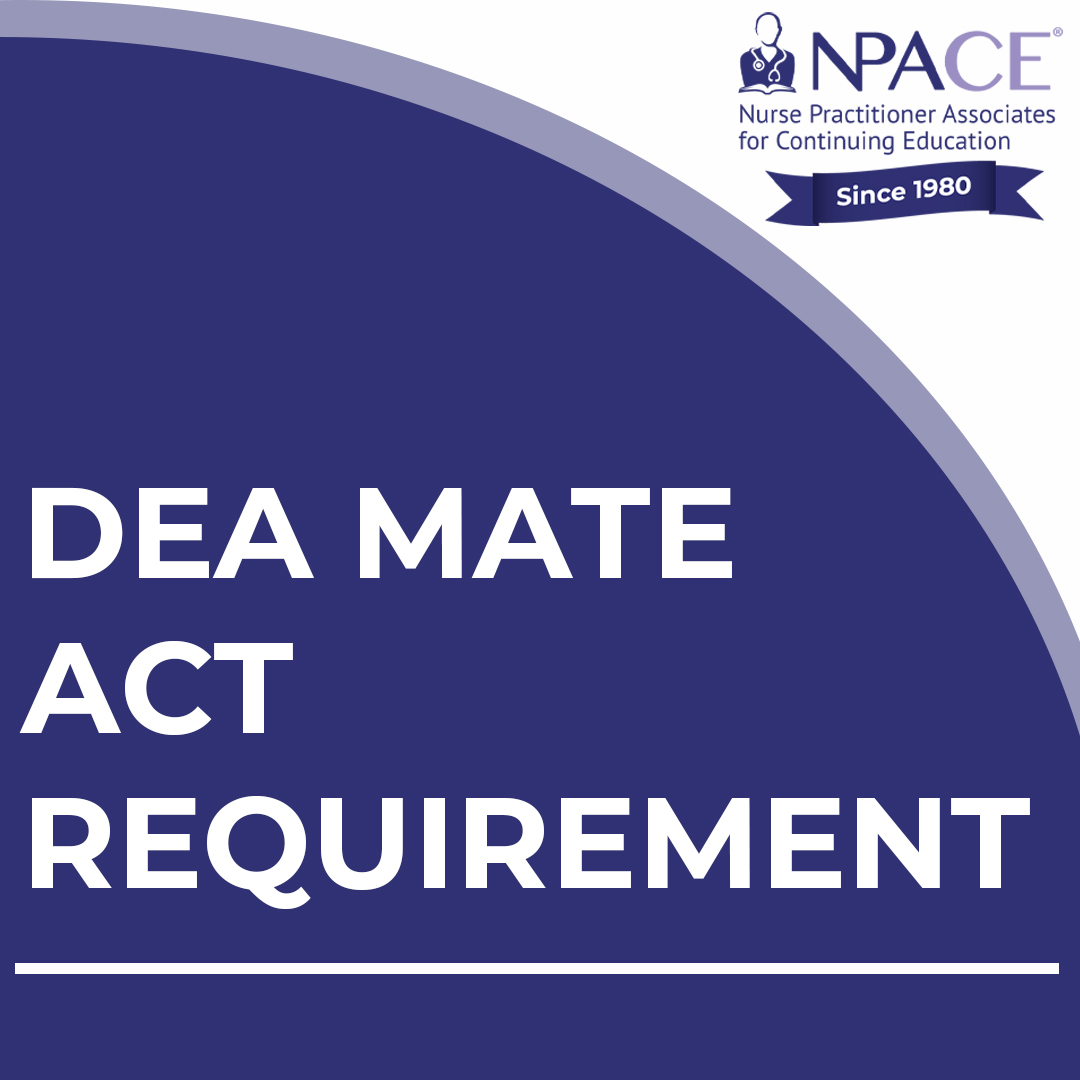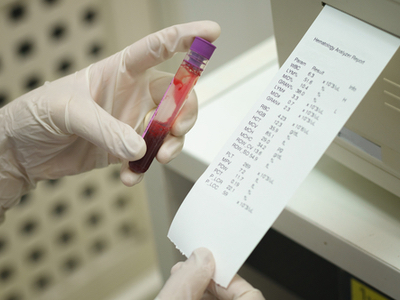
Pharmacology
Meet your national and state pharmacology credit requirements with recordings from NPACE’s live pharmacology conferences. These sessions will help you improve or maintain prescribing skills as well as stay current with the latest in pharmacotherapeutics.
You may filter by category, such as women’s health or diabetes, alphabetically or by date. Click the “View” button to read the Course Description, Course Objectives, Speaker information, CNE Information and Disclosures.
Like what you see? Click “Register” and follow instructions to view the video recording for up to one year. Successful completion of the post-test is required for CE units to be granted.
On-Demand Pharmacology CE
111 Results
-
In accordance with the Medication Access and Training Expansion (MATE) Act, beginning June 7, 2023, all providers who are registered with the DEA are required to complete 8 hours of training on the treatment and management of patients with opioid and other substance use disorders. This bundle fully satisfies this one-time requirement. *Content is accessible for 90 days post purchase*
Total Credits: 9.00 contact hours; 8.5 are pharmacology
Expiration Date: December 31st, 2025$215
$237.50-
Register
- User - $215
- More Information
-
Register
-
Merck Grant Funded Program
The overall goal of this program is to address the barriers in vaccination uptake and integration.
Credits: 1.0 contact hours; 1.0 are Pharmacology
Expiration Date: December 31st, 2025
$10.00
-
Register
- User - $10
- More Information
-
Register
-
Adolescent substance use has followed familiar trends for several decades with alcohol, nicotine, and cannabis leading other drugs in popularity. After several years of declining nicotine use, primarily via combustible cigarettes, recent data suggests a resurgence of nicotine use, primarily via e-cigarettes as well as a marked increase in cannabis use, likely corresponding with legalization efforts. Additionally, there has been an increase in hallucinogen use and the dangers of opioid use have heightened due to the rise of illicit fentanyl being brought in from outside the United States. This lecture will review the most recent Monitoring the Future study and discuss implications of adolescent substance use trends on healthcare providers.
*Due to rapidly changing clinical knowledge, once purchased, you have 90 days access to complete this education.
Credits: 1.50 Contact Hours; 1.50 are Pharmacology
Expiration Date: December 31st, 2025$40
-
Register
- User - $40
- More Information
-
Register
-
"Supported by an educational grant from Merck"
This is a up to date and in depth session discussing the current guidelines for the adult immunization schedule. Discussing the current evidence supporting the need for immunizations and the numbers of illness in the US. Risks and Benefits of immunizations, and myths surrounding immunizations. Every year updated vaccination schedules are provided to guide immunization practices. Keeping up with these updates is often difficult. This session will review changes and updates to the 2024 adult schedule.
*Due to rapidly changing clinical knowledge, once purchased, you have 90 days access to complete this education.
Credits: 1.0 Contact Hours; 1.0 are Pharmacology
This activity is designated for 1.0 AAPA Category 1 CME credits. Approval is valid from 11/7/2024 to 11/6/2025 . PAs should only claim credit commensurate with the extent of their participation
Expiration Date: November 6, 2025$35.00
-
Register
- User - $35
- More Information
-
Register
-
This bundle is the perfect NP CE bundle!! It provides a comprehensive review of important and difficult healthcare topics in Primary Care and Pharmacology. This 18-course bundle covers the management of Diabetes Mellitus, Dyslipidemia, Hypertension, Mens health, Adolescents and substance abuse, and pharmacotherapeutics in Pediatrics. Of added benefit are the latest immunization updates, an in-depth look at Syphilis and some great Ortho for the outpatient setting is also within the bundle. It is a must have for primary care! Purchase this package and earn up to 22.5 CNE credits. | $460.00
Total Credits: 22.5 contact hours; 16.33 are pharmacology
$460.00
$705.00-
Register
- User - $460
- More Information
-
Register
-
In 2019, the Infectious Disease Society of America and American Thoracic Society published updated recommendations for managing patients with community-acquired pneumonia (CAP) generating new considerations for inpatient and outpatient practitioners. This presentation will assess emerging literature influencing the optimal pharmacologic management of CAP such as, changing etiologic trends, patient-specific factors, outcomes evidence, and risk factors for adverse drug reactions.
Credits: 1.50 Contact Hours; 1.50 are Pharmacology
Expiration Date: December 31st, 2025$15.00
-
Register
- User - $15
- More Information
-
Register
-
70% of US adults have obesity or pre-obesity and only 2% are offered pharmacology treatment as part of the evidenced based treatment. It is important for clinicians to know the full evidenced-based management of the disease of obesity. During this presentation the participant will review FDA approved medications and discuss off label options to assist with treatment.
*Due to rapidly changing clinical knowledge, once purchased, you have 90 days access to complete this education.
Credits: 1.0 Contact Hours; 1.0 are Pharmacology
This activity is designated for 1.0 AAPA Category 1 CME credits. Approval is valid from 2/11/2025 to 2/10/2026. PAs should only claim credit commensurate with the extent of their participation
Expiration Date: February 10, 2026$35
-
Register
- User - $35
- More Information
-
Register
-
The presentation will discuss the factors involved in the appropriate use of antibiotics in the outpatient setting including the differential diagnosis of several common infections.
*Due to rapidly changing clinical knowledge, once purchased, you have 90 days access to complete this education.
Credits: 1.50 Contact Hours; 1.50 are Pharmacology
Expiration Date: December 31st, 2025$40
-
Register
- User - $40
- More Information
-
Register
-
This session will provide the nurse practitioner with information regarding common pathogens implicated in AECB and community acquired pneumonia in the patient with underlying co-morbidities such as asthma, COPD and alcohol abuse. Current recommendations regarding antimicrobial treatment options will be reviewed in detail. National recommendations for obtaining chest x-ray and sputum for gram staining will also be discussed.
Credits: 1.50 Contact Hours; 1.50 are Pharmacology
Expiration Date: December 31st, 2025$45
-
Register
- User - $45
- More Information
-
Register
-
This presentation will discuss common laboratory studies utilizing a case-based method. Then review decision-making strategies including the selection of the most appropriate tests for the clinical presentation, based on the current evidence. Lastly, explore the interpretation of the potential findings and develop the best treatment plans as well as any necessary follow-up that may be needed based on the findings.
Credits: 1.00 contact hours; 0.25 are pharmacology
Expiration Date: December 31st, 2025$27.50
-
Register
- User - $27.50
- More Information
-
Register
| Access Date | Quiz Result | Score | Actions |
|---|





